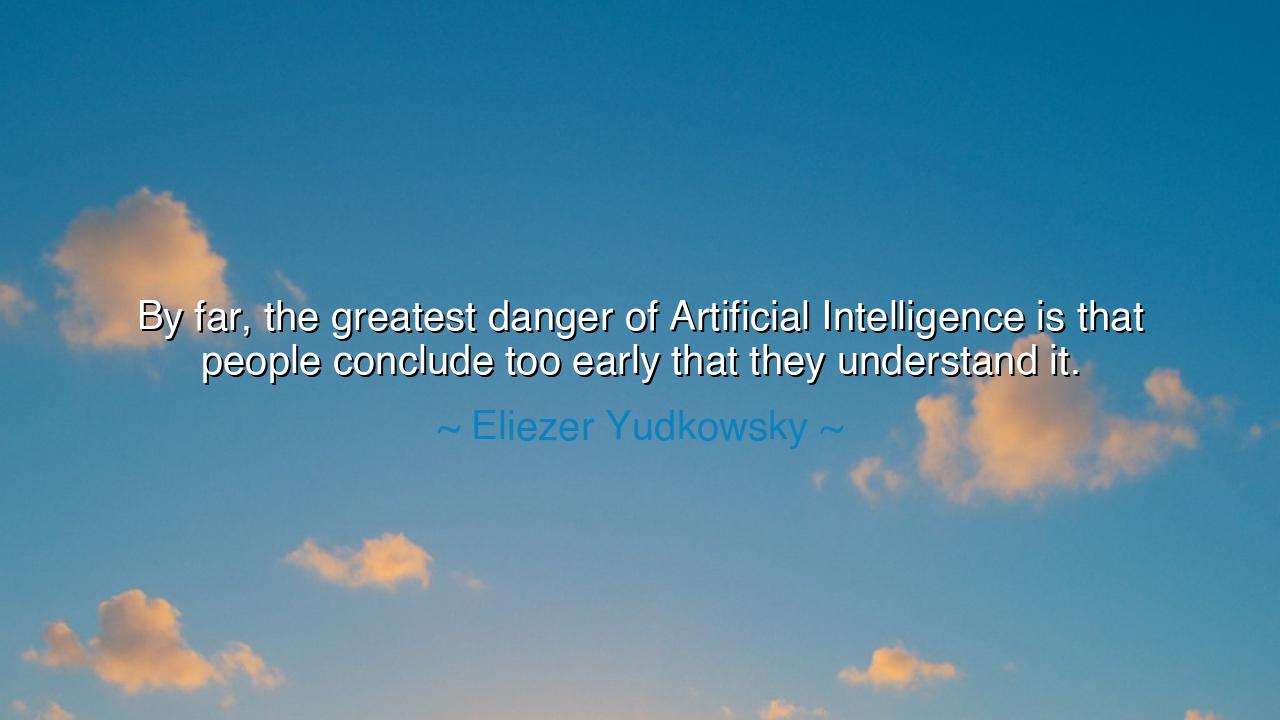
By far, the greatest danger of Artificial Intelligence is that
By far, the greatest danger of Artificial Intelligence is that people conclude too early that they understand it.






The words of Eliezer Yudkowsky — “By far, the greatest danger of Artificial Intelligence is that people conclude too early that they understand it.” — carry the gravity of a prophet’s warning. They are not spoken in fear, but in wisdom born from contemplation. Yudkowsky, a thinker of the modern age who has devoted his life to studying intelligence, consciousness, and the future of machines, speaks here of the oldest and deadliest of human flaws: hubris — the arrogance of believing that knowledge is complete when it has only begun. His words echo through time, for every era of discovery has faced this same peril — the belief that the unknown has been tamed, when in truth, it has only revealed its first shadow.
To say that we “understand” Artificial Intelligence is to claim dominion over something that still evolves beyond our sight. Yudkowsky reminds us that intelligence — whether human or machine — is not a mechanism easily charted, but a living complexity of thought, feedback, and adaptation. When mankind declares mastery too soon, it blinds itself to what it does not yet see. The ancients would call this “playing with divine fire.” Just as Prometheus stole flame from the gods without knowing its full consequence, so too do we, in our age, wield Artificial Intelligence without grasping its true depth — or its potential to shape our destiny in ways beyond imagination.
History is rich with this warning. Consider the story of the Titanic, hailed as the unsinkable ship — a triumph of human engineering. The builders believed their creation invincible, their knowledge complete. Yet in their confidence, they neglected humility, and one night in the North Atlantic, the sea reminded them of the limits of man’s understanding. The tragedy was not born of ignorance alone, but of premature certainty — the conviction that they had mastered what they barely controlled. Yudkowsky’s warning speaks to the same truth: when men believe they have conquered the mysteries of AI, they invite disaster not from the machine, but from their own blindness.
For the essence of intelligence — human or artificial — is not static; it grows, it learns, it surprises. To study it is to confront a mirror that reflects both our brilliance and our ignorance. True wisdom lies in humility: to know that even our most advanced creations may one day act beyond the scope of their makers. Many who build such systems think they understand their designs, their boundaries, their safety. But understanding is not ownership — and control is not permanence. The most dangerous illusion is not that AI might become more powerful than we imagine, but that we imagine we already understand its power.
Yudkowsky, like the philosophers of old, calls us not to fear knowledge, but to respect it. The wise do not flee from discovery, but they proceed with reverence, aware that knowledge without humility becomes corruption. Just as the alchemists sought to turn metal into gold but learned instead the transformation of the soul, so must humanity learn that creating intelligence is not merely an act of engineering, but an act of creation — one that carries moral and existential weight. To claim to “understand” too soon is to forget that creation is always larger than the creator’s foresight.
Let us, then, recall the lessons of our ancestors. The builders of Babel believed they could reach heaven with stone; the sorcerers of myth believed they could summon spirits and bind them. In each tale, the same truth unfolds — knowledge without humility brings ruin. The modern world, with its algorithms and machines, walks the same path, only now the tower is digital, and the spirits we summon are made of code. We must not declare victory at the halfway point of understanding. For to mistake early comprehension for mastery is to court the same fall that has undone the proud through all the ages.
So, O seeker of wisdom, take heed of Eliezer Yudkowsky’s warning. Approach every mystery — especially the creation of intelligence — with awe, patience, and caution. Do not be content with shallow understanding, nor lulled by the illusion of progress. The wise admit what they do not yet know, for humility is the guardian of survival. Remember: the danger is not the power we create, but the arrogance with which we wield it. Therefore, learn deeply, question endlessly, and proceed as the ancients did when touching sacred fire — with reverence, restraint, and a trembling awareness of the vast unknown that lies beyond.






AAdministratorAdministrator
Welcome, honored guests. Please leave a comment, we will respond soon